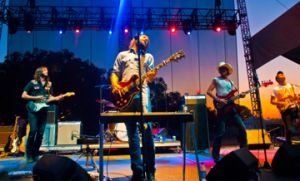Band Of Horses: Rock and Roll, the American Way

Photo by Dave Vann
Band of Horses are an American rock and roll band from Charleston, South Carolina. The emphasis in that statement should be on the word “American” and it is not used here to denote the nation so much as the notion: Band of Horses are an American rock and roll band from Charleston, South Carolina.
And, actually, that’s not entirely true. They’re American alright, but frontman Ben Bridwell first formed the band in Seattle before relocating to Charleston. His bandmates, meanwhile, have scattered themselves across the country’s wingspan, from New England to Southern California, from sea to shining sea. But it’s what they’ve done, not where they’re from – and, of course, their colorful commentary along the way – that gives them that “Born in the U.S.A.” designation. Band of Horses’ success, confesses Bridwell, “makes no sense to me, whatsoever.” Maybe that has something to do with it, too.
Bassist Bill Reynolds unwittingly gives weight to the “American rock band” designation when, unprompted, he tells me, “Ben is an American original.” And, like anyone in their mid-30s who grew up under the stars and stripes, Bridwell knows better than to believe that the American dream is anybody’s birthright. He is acutely aware that a set of unreliable variables, such as luck and good timing, are silent partners behind just about every success. And those things have had at least some kind of role in getting Band of Horses where they are today.
But Bridwell also knows that success has never come without hard work and, more important, that success will not stick without it. As Thomas Jefferson once reportedly said, “I’m a great believer in luck, and I find the harder I work, the more I have of it.”
Of course, if it was up to him, Bridwell might have you believe that Band of Horses actually owes most of their success to a series of happy accidents. He’s persistently humble and consistently self-deprecating. When I mention how much I love the new album, Mirage Rock, he deflects the compliment by stating that, artistically, his songwriting has been on a “downward spiral” since the band’s debut, Everything All the Time, dropped in 2006. I insist that he must be joking. “Sorry,” he replies. “It’s a defense mechanism.”
Also, Bridwell has a frontman complex. He’ll tell you that the band is a democracy and that’s partially true. As a nation, so is America. When “We, the People” speak up about something, we can make our voices heard. If we’re loud enough, anyway. But the President is the only one that can press the red button. So, OK then, as a group, Band of Horses might be something of a democracy. But as an institution, Ben Bridwell is the Commander-in-Chief. And while he remains shifty about retaining that kind of title, the truth is, his bandmates stand united behind him, 100 percent. His approval rating is higher than any U.S. president in history.
“Ben is our fearless leader,” says keyboardist Ryan Monroe. “And his voice, to me, is the stamp. That’s what makes us sound like Band of Horses more than anything else. He’s essentially my boss and one of my best friends.”
*
Like an inspirational montage about some star athlete who pulled himself up out of nothing from nowhere, Bridwell has come a long way from washing dishes for a living. “I was destined to just flip burgers for the rest of my life,” he says.
A part of him will never believe that those days are behind him for good, forever bracing for some kind of Cinderella moment when the clock will strike midnight.
It’s not impossible to see why Bridwell might feel that way even if, to the listener, his talents are obvious. (For he is absolutely a natural talent.) He’s also what they call a late bloomer. He didn’t pick up guitar or begin writing songs until he was already in his mid-20s. The first song that he remembers writing, the presciently titled “Part One,” ended up on the band’s first album. And it’s a good one.
Amazingly, Bridwell didn’t even learn how to properly tune a guitar until a couple albums deep. Initially, he would just de-tune a six-string until it sounded OK with where he placed his hands, “having no idea how to actually do real chords,” he says. “That’s where the ‘Funerals’ and ‘The Great Salt Lakes’ come from.” (He’s in agreement with fans that those are among his best songs.)
He took two guitar lessons before recording 2010’s Infinite Arms and he’s not sure if they were helpful or detrimental. He says that he wouldn’t be able to write another “The Funeral” if he tried. But at least he knows what a C chord is, now.

Photo by Christopher Wilson
Perpetually worried that his ever-growing success might be a fluke, Bridwell’s original title for his band was just “Horses,” to serve as a permanent reminder of the time in his life when he was homeless. He got the title from a Will Oldham (now known as Bonnie “Prince” Billy) song of the same name. It starts off like this: “I’d be riding horses if they let me/ Sleep outside at night and not take fright.”
“I was sleeping outside, on church steps or on Ryder trucks and shit,” says Bridwell, “and it always brought me a sense of comfort, to hear those words, every night before I went to bed. I’d play it on my little tape Walkman. So, hopefully, it always brings me back to not feeling entitled or like I deserve anything. You’ve got to earn it.”
In his characteristically self-effacing way, Bridwell might have you imagining him doing little more than sweeping floors and working in the dish pit at diners during his early adulthood. But it must be noted that, in Seattle in the late ‘90s, he founded his own record label, Brown Records, with the intent of helping his friends’ bands out by putting a few copies of their albums on local shelves.
When he went to do this for his friend Sam Beam, who played under the moniker Iron & Wine, he realized that his micro-label would be too limiting. So he took it upon himself to share Beam’s music with people that might be able to do something with it. It’s an action that led directly to Sub Pop offering Iron & Wine their first record deal. Karmically, Beam returned the favor in 2005 when he let Band of Horses open some shows for him in Seattle. After label folks caught a set, Sub Pop offered Band of Horses their own deal.
*
Bridwell originally assembled Band of Horses as a vehicle for his newly-discovered singing and songwriting abilities. But after going through some early personnel changes, it finally started feeling more like a band than a solo project – which is exactly what Bridwell was looking for. It’s now locked into what he hopes will be its lifelong lineup.
When Infinite Arms came out in 2010, the press often quotes Bridwell as saying that he felt like it was the first real Band of Horses album. That quote created some ripples at the time and he clarifies now that he just meant that the band had finally solidified as a unit. And they’ve only continued to get stronger, since. Guitarist Tyler Ramsey is “the new guy,” says Bridwell, “and he’s been with us for five years.”
When putting the pieces together, Bridwell had the rather unusual luxury of being able to only hire friends that he wanted to travel the world with, playing music. People he loved on a personal level. But make no mistake about it – Band of Horses is a band of professionals. Reynolds had just finished producing The Avett Brothers’ breakout album Emotionalism when he was brought into the fold. Both Monroe and Ramsey have excellent solo albums out. And all of them are songwriters in their own right.
Drummer Creighton Barrett is the one Bridwell has known the longest. “He’s the very enthusiastic, big personality guy, like a lot of drummers are because they have to make up for not being real artists or musicians or even good people,” jokes Bridwell. “So he has that very sweet personality – very funny.”
When the others are asked to describe their bandmates, they all seem to think that each of the others are, in turn, “the most musical,” “the most gifted” or “the most insanely talented” of the bunch. And they all seem to laugh at each other’s jokes. In short, this is a band that loves each other. The way it probably should be.
*
So, with that kind of mutual respect and talent pool, in 2009, the newly-solidified Band of Horses decided to self-produce their third full-length album, Infinite Arms. At the time, it was less an act of bravery and more just the good old American habit of making do with what you’ve got – their previous producer, the famed Phil Ek, was simply unavailable.
The band’s contract with Sub Pop had expired so they didn’t know if what they were making would ever even be distributed. In a leap of faith, Bridwell used his personal tour income to finance the sessions, then shopped the album around to labels after it was finished. Despite recording on their own dime, the band took their time and learned the art of the overdub until they came up with a flawless album. In a country that rewards risk, their strategy paid off; they landed a sweet deal with Columbia Records – home of Bob Dylan, Bruce Springsteen and Johnny Cash. Upon its release in 2010, Infinite Arms was nominated for a Grammy for Best Alternative Album.

When they started getting their heads around making a new album last year, the only thing they knew for sure was – now that they had the backing of a major label – that they wanted to do something different. First thought: Hire a new producer. So they assembled a wish list – Daniel Lanois’ and John Cale’s names were both on there. But then, the band’s management suggested that they try to enlist Glyn Johns, who had just worked with another client of theirs, Ryan Adams.
Johns wasn’t on their initial short list, but once his name came up, everyone was completely star struck. Johns has a résumé that is so solid he doesn’t need to carry around a résumé. He’s produced some of the best albums by The Rolling Stones, The Who, Led Zeppelin, Eric Clapton, The Eagles and dozens more. He engineered the Beatles’ Let It Be. You can’t scroll more than a couple songs down any classic rock playlist without running into Johns’ work. So, without knowing what they were going for, they flew Johns out to a show in Washington, D.C., to see if he’d be willing to take them on.
“I was confused when I first saw them,” Johns admits. “The material was so varied, from manic rock and roll to country ballads with fabulous harmonies – and everything in between. I wanted to clarify what the band wanted to achieve.”
So he sat them down and asked them, “What kind of band are you?” In other words, he was requesting that the band define – or, perhaps, redefine – themselves. And at least take responsibility for how they play.
“He was like, ‘I heard you guys doing all sorts of stuff. So what are you? Are you like a super mellow, vocal band or are you like a super angular indie band?’” remembers Monroe. “And we came to the conclusion that we don’t have to fucking choose. We never have to. We never want to be put in a corner. For this record, we have a little bit of all of that and I think, from here on out, our records are going to have a little bit of both of those things.”
You make it up as you go along, or so the American Story goes, and if you don’t like it or if you get bored or whatever, then you’re free to reinvent yourself. Flip the script. And so, Band of Horses have done likewise, further fulfilling their narrative.
*
Infinite Arms is dreamy. Unworldly. Perfect.
Mirage Rock is a remarkably different album than Infinite Arms. It’s guttural and earthy. Most surprising for anyone who has listened attentively to previous Band of Horses releases, it’s completely raw. It’s from the garage, not the heavens.
Despite being on a major label and despite having a proper recording budget and despite having a big-shot producer, there are rough patches throughout the album. This was by design (and I should mention that this, too, is a very American approach to art). Granted, most of this is the result of having Johns on the project. It’s a reflection of his aesthetic and his style (See: My Generation, Exile on Main Street ). Johns likes to record straight-to-tape without many overdubs. He also uses vintage analog equipment which makes too many overdubs virtually impossible, anyway. He has the band play live. He has them sing and play their instruments at the same time. And he doesn’t use Pro Tools.
“He wasn’t concerned so much with a song’s performance, but if it had some sort of energy that he was looking for, that’s the take that he wanted to be the keeper,” says Monroe. “I’d be like, ‘Man, I flubbed that note on the bridge.’ And he’s like, ‘Oh man, get over yourself. Nobody cares about that one note. It’s the overall thing.’ And he’d go, ‘That’s rock and roll, isn’t it?’…We learned to deal with small errors and Glyn seemed to think that those were the beautiful parts. And to be honest, those are some of my favorite parts of a lot of the records that he did.”
Because Reynolds was more of a producer than an active bassist before joining Band of Horses, he was able to appreciate the authority that Johns demanded in the studio. “When you trust somebody, you can just go with playing bass and the rest is on them,” he says. “Glyn immediately commands respect because he’s been doing it for so long. We knew that he was going to do stuff that maybe he had done with bands in the past and that it wasn’t the style of recording that’s done nowadays as much. It’s different because he likes rough edges and, as a band, it’s hard to sometimes listen to your rough edges. But, as a listener, that’s what people actually look for.”
That’s rock and roll, isn’t it?
“In this day and age, we’ve been in the studio enough times to know that you can do anything you want,” says Reynolds. “You can make any record you want with a computer – so we didn’t have a computer. We did it all on tape. It was fun to keep it rough like that.”

Photo by Christopher Wilson
For Bridwell, the experience of being in the studio with Johns was truly something of an earth-shaker. It was a learning experience – for the band as a whole, sure; but also, for Bridwell as a human being. The vulnerability of the warts-and-all approach may have left him feeling a little exposed in a removed, “hope you like this one” sort of way.
In the studio, Johns insisted that Bridwell engage in a more immediate dance with his devils: The sessions for Mirage Rock began with the band coming into the studio in the morning – well before conventional rock and roll hours – and grabbing some coffee. Then, at Johns’ insistence, Bridwell would demo his songs live, performing them on acoustic guitar for his bandmates.
“I don’t even play guitar in front of my kids at home,” says Bridwell. “It was really scary.”
While Bridwell is intent on keeping Band of Horses as a band of brothers, he’s still too painfully shy about his songwriting to collaborate with anyone in person. Any of his co-writers most likely achieved that distinction through the miracle of high-speed Internet. Not only won’t he play guitar in front of his toddlers, he won’t write any music at home, even locked in his bedroom. He’s too frightened that the walls have ears.
For previous song cycles, Bridwell would usually rent a cabin in some far- off woods where nobody would be able to hear him fumble around in the dark, searching for some far-off melody. He likes to write music in the kind of forest where if a tree falls, it doesn’t make a sound.
After touring ended for Infinite Arms, Bridwell wanted to maximize quality time with his wife and kids. Being a good father and a good husband is something that’s incredibly important to him. He wrote many of the songs on Mirage Rock in hotel rooms while the band was still on tour. Others he wrote in the band’s storage unit or his work shed.
“Even knowing that somebody’s on the other side of the wall in a hotel, or if I’m at a cabin and I see other people show up for vacations or something, I’m looking out the window half the time just wondering if they can hear me complaining or singing or whatever you want to call it,” Bridwell says.
However, he wrote one song during an aborted 10-day writing retreat in the Smoky Mountains near Pigeon Forge, Tenn., this past January. “It was just a fucking nightmare,” Bridwell recounts. “I was such a mess. I ended up leaving early because I just felt like I had a case of writer’s block.”
When he showed up to his cabin, he accidentally tripped the alarm, couldn’t turn it off and, the next thing he knew, he was dealing with police. He had also brought Johns’ catalog with him as if to size himself up against the producers’ past clients.
“I started listening to a lot of music instead of actually writing,” says Bridwell. “Glyn had given me some tips as to how I could improve some trappings in my own songwriting and so I started listening to music and trying to see how other people do things…It just took me out of what came naturally for me, so I started to over-think a bit. And stress. It stymied me, man.”
He did write a song on the first night that, at first, he liked. But the more he listened to examples of more classic songwriting, the less confident he was in his own abilities. “So I just put the song away, man, thinking it was a total shitter.”
When sessions for Mirage Rock convened, and the band considered somewhere around 60 potential songs, Bridwell’s bandmates loved that particular sketch and all but forced him to polish it off.
This is where the democratic side of the band comes into play and, good thing for it, too: In typical Band of Horses fashion, that song ended up being Bridwell’s favorite on the album. Mine, too. It’s called “Slow Cruel Hands of Time” and it sounds like vintage Band of Horses.
*
“Even though there are a lot of mellow moments on Mirage Rock, for me, it feels like our most rocking record and that’s mostly because Glyn added the ‘and roll’ part to it,” says Bridwell. "There’s the rock, that any band can bring, but that ‘and roll’ part – I think – is interesting and different for us. It really does feel like more of an art project with Glyn. Like we’ve taken a step in this time machine and who gives a shit if it ain’t so much of ‘Funerals’ and ‘Salt Lakes’ – this is a project that we’re doing with this incredible contributor to what is rock and roll as we know it.
“If you think about it, everybody’s always like, ‘That rocks’ or ‘Man, you guys rock!’ I want it to be like, ‘You guys, ‘and roll,’ man!’”
And so it is that I can stand confidently by my first sentence for this article. However, I would like to add one word. After all, Band of Horses is a great American rock and roll band.



















